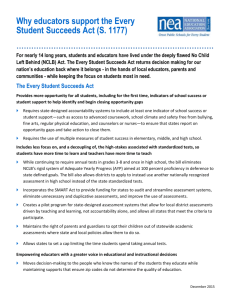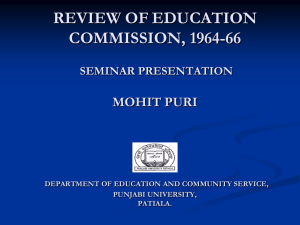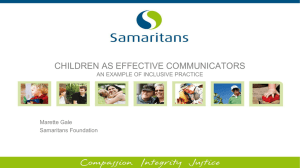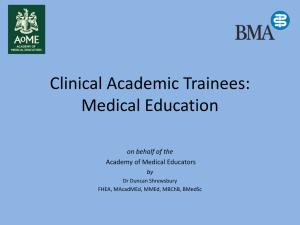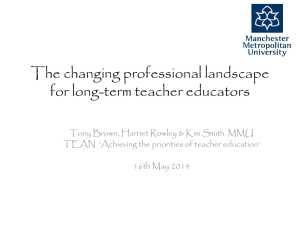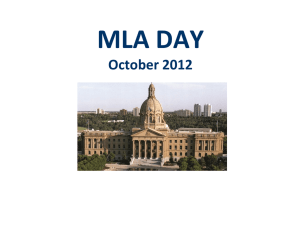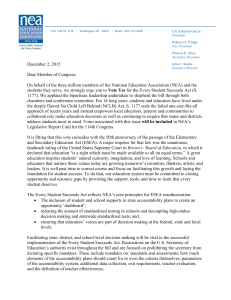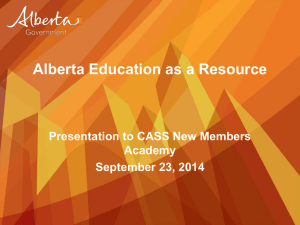Enhancing Teacher Assessment Capacity
advertisement
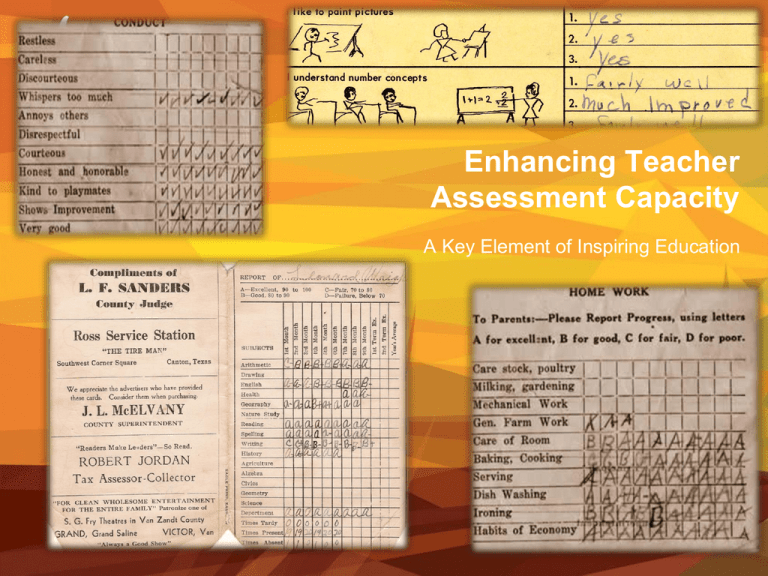
Enhancing Teacher Assessment Capacity A Key Element of Inspiring Education Assessment Capacity: Origins The Assessment Capacity Project supports and is responsive to the direction provided by Inspiring Education: A Dialogue with Albertans (2010). • “Review assessment to align with a competency-based system.” Assessment Capacity: Origins • Require school- and district-based leaders to demonstrate assessment literacy within their instructional leadership practice across all subject areas. • Be guided by the Principles for Fair Assessment Practices for Education in Canada. • Require teachers to demonstrate detailed knowledge of the Program of Studies for the courses they teach. • Incorporate student voice into all assessment practices. • Report academic achievement, behaviour, and social-emotional development separately and accurately. • Focus on coherence among curriculum-teaching-assessment-professional development. • Be characterized by educators ongoing participation in coordinated and coherent school and district-based professional development that occurs within and across schools, plus within and across disciplines. • Be supported by evidence-based rather that opinion-based professional development. Assessment Capacity: Origins “Approximately 83% of educator respondents agreed that their level of knowledge [of assessment] was substantial… . Even though educators rated their knowledge as high, many did not articulate this sentiment overtly in the interviews… .” (page 96) “We really don’t know how to assess. We’re lost about how to assess many of our students.” “Teachers should know more about making assessment objective.” “There are differences in understandings across all the staff and that is where the misconceptions are coming in when people don’t have the shared understanding.” “There is still a lot of work to be done. It is personal experience but I know what is going on in my school as well as other elementary teachers and we are working on this [assessment] and trying to change things. Assessment Capacity: Origins http://education.alberta.ca/media/1165 612/albertaassessmentstudyfinalrepo rt.pdf Assessment Capacity: Origins DIRECTIONS FOR FUTURE CURRICULUM System-Focused Student-Focused Content-focused Focus on competencies Prescriptive curriculum with limited flexibility Opportunities for local decision making and greater depth of study Primarily focused on summative assessment Balance among formative and summative assessments Print-based Digitally based Ministry-led development Collaborative and co-development models Sequential development Synchronous development Assessment Capacity: Goals • Provide educators with the necessary skills and tools to fairly assess student progress. • Develop with stakeholders a sustainable system of professional development for current and new teachers to provide them with opportunities to enhance their ability to use assessment effectively in various contexts. • Communicate to educators the necessity to measure student progress consistent with provincial standards. • Develop a shared understanding of educational standards amongst educators. • Familiarize educators with opportunities for the application of alternate methods of assessment delivery such as digital and online. • Provide educators with opportunities to network and have professional and focused discussions on various aspects of assessment. Assessment Capacity: In Scope • • • • • • Discussions with stakeholders and clients about the need for assessment capacity in Alberta and the value of a sustainable system of professional development for current and new teachers. Potential contracts or grants with organizations such as the Alberta Assessment Consortium, the Alberta Teachers’ Association, and the Alberta Regional Professional Development Consortia to assist in the development and delivery of assessment capacity. Gathering information from the grant deliverables of Curriculum Development Prototyping Request for Proposals relative to classroom based assessments. Provide support to the prototyping sites related to classroom assessments. Presentations explaining the goals and objectives of the Assessment Capacity Project to conventions, conferences and forums hosted by stakeholder groups such as the ATA, CASS, Speak Out, and the ASBA. Professional development training sessions for teacher inservice leaders; coordinated through existing PD providers such as the AAC, the ARPDC and the ATA. Assessment Capacity: Out of Scope • Student Learning Assessments (SLAs) and related assessment supports. • Provincial Diploma Examinations. • Mandating changes to locally-developed assessment and reporting policies unless any such policies or elements thereof contravene assessment and/or reporting policies of the ministry. Assessment Capacity: Summing Up Assessment is a central element of education. The Assessment Capacity empowerment. It is intended to provide educators with Project is about empowerment. the skillset and tools necessary to fairly assess student progress in a manner consistent with the values and principles stated in Inspiring Education. The ultimate benefactors of an education system in which assessment capacity has been enhanced are students. Students will have assurance that they have been assessed in a fair, valid and reliable manner, and have access to informative feedback that will allow them to reach their full potential by developing the competencies of Engaged Thinkers and Ethical Citizens with an Entrepreneurial Spirit. Assessment Capacity: Courses of Action Enhance the ability of educators to fairly assess student achievement. Support the development of assessment models appropriate to new provincial programs of study. Assessment Capacity: Enhancement for the Current System • Work with key stakeholders to establish a sustainable professional development system to enhance and improve assessment practices and establish networks to facilitate dialogue on assessment practices • Develop within Alberta’s k-12 education sector an understanding of the importance of having a shared understanding of provincial standards • Work with universities to ensure education graduates possess the capacity to provide fair assessment once serving in the teaching workforce Assessment Capacity: Preparation for a Competency-Based Curriculum • Work with prototyping sites to collaborate in the development of assessment models consistent with and in support of a competency-based curriculum. • Provide support to the prototyping sites related to classroom assessments Assessment Capacity: Foundational Documents Principles for Fair Assessment Practices for Education in Canada (1993) Fair Assessment Principles • Co-constructed by representatives from the provincial and territorial Ministries of Education and 9 educational organizations in Canada over 21 months • The document can be considered representative of the ideals within the Canadian educational community about fair assessment in the 1990s. • Chaired by Dr. Todd Rogers • Part A for classroom assessment, Part B for standardized assessment • Should be considered neither exhaustive nor mandatory but rather reflect the intent and spirit of assessment Principles for Fair Assessment Practices for Education in Canada (1993) • • • • • Developing/Choosing Assessment Methods Collecting Assessment Information Judging and Scoring Performance Summarizing and Interpreting Results Reporting Assessment Findings The principles are being edited and adjusted with several new principles added to reflect changes that have occurred in assessment practices since 1993. Principles of Quality Classroom Assessment (AAC, 2012) Preliminary Steps: Gather Input from Educators • What PD support for Assessment Capacity is most needed? Gather Input from Students • What are their thoughts about the assessments teachers currently provide. Questions and Comments For further information contact: Tim Coates, Coordinator Assessment Capacity Project 780-422-5160 Tim.Coates@gov.ab.ca
